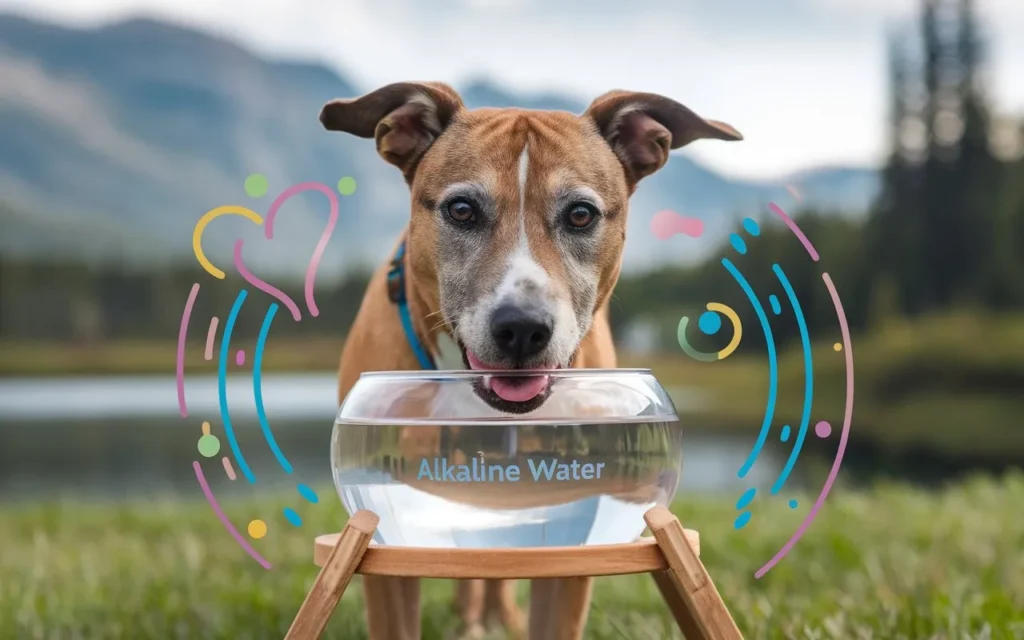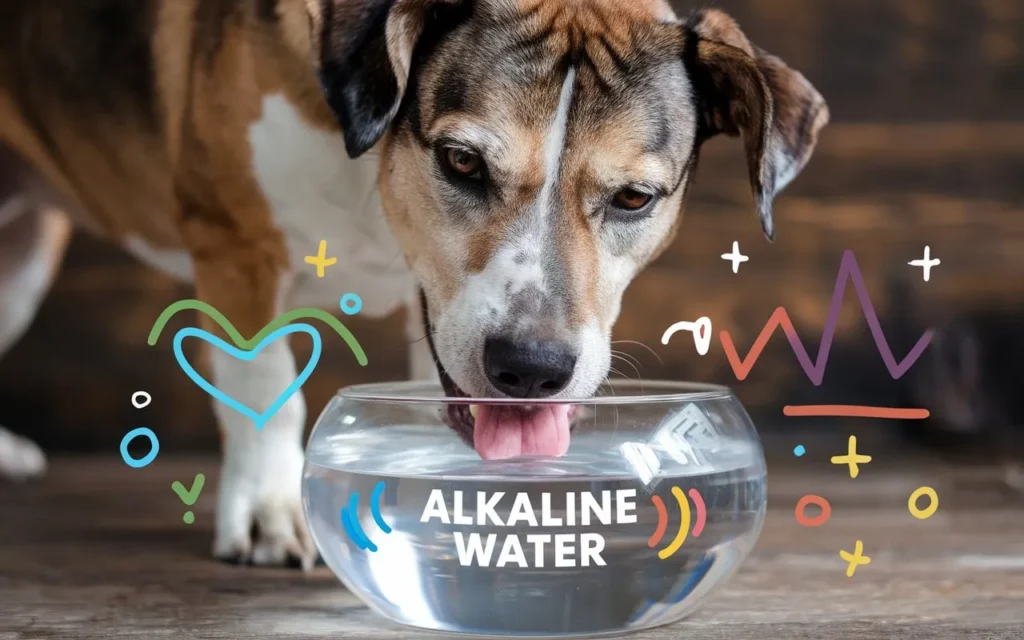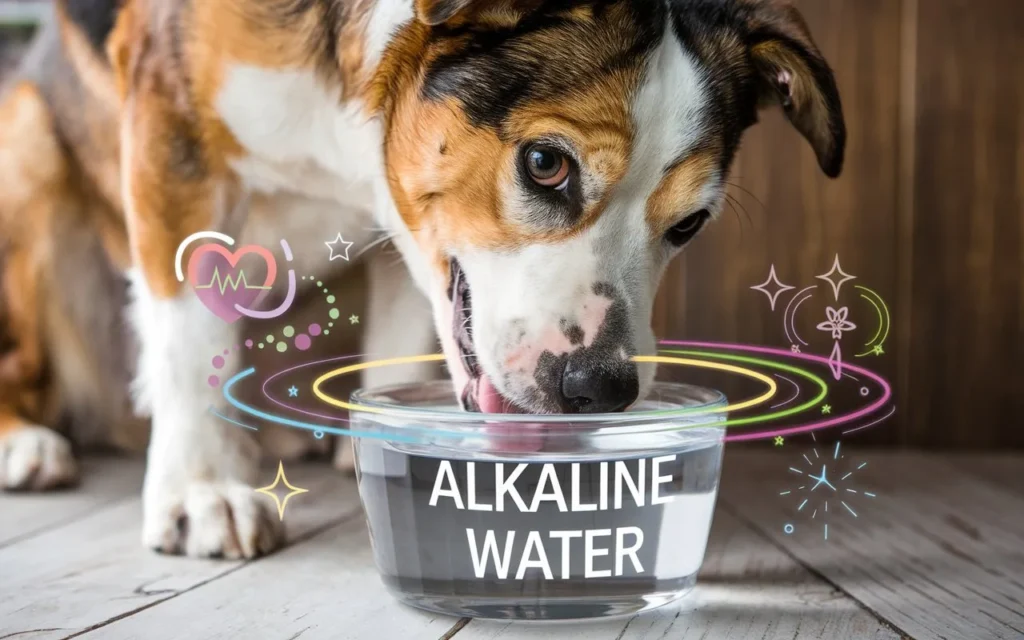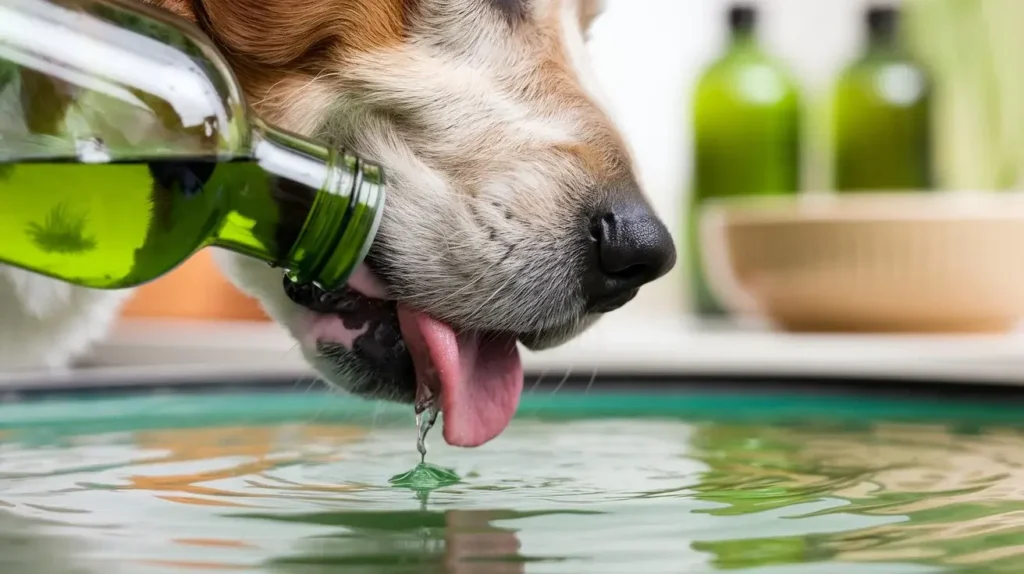Is alkaline water good for dogs? This question has recently sparked intense debate among pet owners, as the alkaline water trend has rapidly expanded from human health circles into the realm of pet care. As devoted dog owners, we consistently strive to provide the best for our furry companions, including their hydration needs. However, before you hastily replace your pup’s regular water bowl with an alkaline alternative, let’s thoroughly examine this topic and explore what experts have to say.
Understanding Alkaline Water: What Sets It Apart?
Before we delve into whether alkaline water is good for dogs, it’s essential to grasp the concept of alkaline water and how it differs from regular tap or filtered water.
What is Alkaline Water?
Alkaline water stands out due to its higher pH level compared to regular drinking water. While normal water typically maintains a neutral pH of 7, alkaline water boasts a pH of 8 or 9. Manufacturers achieve this increased alkalinity through a process called electrolysis, which effectively separates the acidic and alkaline components of water.
The Purported Benefits of Alkaline Water for Humans
Proponents of alkaline water enthusiastically claim it offers numerous health benefits for humans, including:
- Enhanced hydration
- Improved digestion
- Boosted energy levels
- Strengthened immune function
- Decelerated aging process
- Alleviated acid reflux symptoms
Nevertheless, it’s crucial to note that many of these claims lack substantial scientific backing. Consequently, if the benefits for humans remain under debate, where does that leave our canine companions?

Can Dogs Have Alkaline Water? Exploring the Canine Perspective
Can Dog Have Alkaline Water : Now that we’ve covered the basics of alkaline water, let’s address the pressing question: is alkaline water good for dogs to drink?
The Canine Digestive System: A Brief Overview
To understand how alkaline water might affect dogs, we must first consider their unique digestive system:
- Dogs possess a digestive system that is shorter in length than that of humans
- Their stomach acid is more concentrated and acidic than ours.
- Canine bodies naturally maintain their own pH balance.
These factors play a crucial role in determining whether alkaline water could benefit or potentially harm our four-legged friends.
Potential Benefits
While research specifically on dogs and alkaline water remains limited, some pet owners and veterinarians have reported potential benefits:
- Improved hydration: Some experts suggest that the smaller water molecule clusters in alkaline water are more easily absorbed by the body.
- Reduced acidity: Alkaline water might help neutralize excess acid in the body, potentially easing symptoms of acid reflux or other digestive issues.
- Antioxidant properties: Alkaline water supposedly has antioxidant effects, which could support overall health and potentially slow aging.
- Better taste: Some dogs may prefer the taste of alkaline water, thus encouraging them to drink more and stay better hydrated.
Potential Risks and Concerns
On the flip side, several concerns arise when considering giving alkaline water to dogs:
- Disruption of natural pH balance: Dogs’ bodies efficiently maintain their own pH levels. Introducing highly alkaline water could potentially disrupt this delicate balance.
- Reduced stomach acid effectiveness: The high acidity of a dog’s stomach plays a crucial role in breaking down food and killing harmful bacteria. Alkaline water might interfere with this essential process.
- Mineral imbalances: Some alkaline water products contain added minerals, which could lead to imbalances if consumed in large quantities.
- Lack of scientific evidence: There’s a significant shortage of peer-reviewed studies on the effects of alkaline water on dogs, making it challenging to draw definitive conclusions.
Expert Opinions: What Veterinarians Say
To gain a more professional perspective on whether alkaline water is good for dogs and cats, let’s examine what veterinary experts have to say on the matter.
Dr. Karen Becker’s Take on Alkaline Water for Pets
Dr. Karen Becker, a proactive and integrative wellness veterinarian, offers a cautious approach:
“While alkaline water may offer some benefits for humans, it’s crucial to remember that dogs have different physiological needs. Their bodies naturally maintain proper pH levels. Introducing highly alkaline water could potentially disrupt this balance.”
Dr. Marty Goldstein’s Perspective
Dr. Marty Goldstein, a holistic veterinarian and author, shares a more positive view:
“From my observations, some dogs experiencing chronic health issues have shown notable improvements when given alkaline water. However, it’s vital to introduce it gradually and monitor your pet closely for any adverse reactions.”
The Consensus Among Veterinary Professionals
Most veterinarians agree on the following points:
- More research is needed to definitively determine if alkaline water is good for dogs.
- If you choose to offer alkaline water to your dog, do so in moderation.
- Always consult with your veterinarian before making significant changes to your dog’s diet or water intake.

How to Safely Introduce Alkaline Water to Your Dog’s Diet
If you’re considering giving alkaline water to your dog, follow these guidelines:
- Start slowly: Begin by mixing a small amount of alkaline water with your dog’s regular water.
- Monitor closely: Watch for any changes in your dog’s behavior, appetite, or bathroom habits.
- Stay hydrated: Ensure your dog always has access to regular water as well.
- Choose quality: If opting for alkaline water, select a high-quality brand specifically formulated for pets.
- Consult your vet: Always discuss any dietary changes with your veterinarian, especially if your dog has pre-existing health conditions.
Alternatives to Alkaline Water for Promoting Dog Health
If you’re looking for ways to boost your dog’s health and hydration without resorting to alkaline water, consider these alternatives:
- Fresh, clean water: Ensure your dog always has access to clean, fresh water. Replace the water frequently and ensure the bowl is cleaned every day.
- Filtered water: Use a high-quality water filter to remove impurities from tap water.
- Bone broth: Offer unsalted, homemade bone broth as an occasional treat to boost hydration and nutrition.
- Wet food: Incorporate wet food into your dog’s diet to increase moisture intake.
- Pet water fountains: Some dogs prefer moving water and may drink more from a fountain-style bowl.
The Bottom Line: Is Alkaline Water Good for Dogs?
After exploring various aspects of alkaline water and its potential effects on dogs, we can conclude that the jury is still out on whether alkaline water is definitively good for dogs. While some pet owners report positive experiences, the lack of scientific evidence and potential risks cannot be ignored.
Here’s a summary of key points to consider:
- Limited research: There’s a significant lack of scientific studies on the effects of alkaline water on dogs.
- Individual differences: What works for one dog may not work for another.
- Natural pH balance: Dogs’ bodies efficiently maintain their own pH levels.
- Potential benefits: Some dogs may experience improved hydration or digestion.
- Possible risks: Disruption of natural pH balance and reduced stomach acid effectiveness are concerns.
- Expert caution: Most veterinarians advise a conservative approach to alkaline water for dogs.
Ultimately, your veterinarian should assist you in making such a decision considering your pet’s specific health needs and circumstances. Remember, clean, fresh water is the safest and most reliable option to keep your canine companion well hydrated and healthy.

FAQs: Common Questions About Alkaline Water and Dogs
To further address common concerns about whether alkaline water is good for dogs to drink, let’s tackle some frequently asked questions:
1. Can puppies drink alkaline water?
Experts generally don’t recommend giving alkaline water to puppies. Their developing digestive systems are particularly sensitive, and introducing alkaline water could potentially disrupt their natural pH balance. Therefore, it’s best to stick to clean, fresh water for puppies.
2. How often can I give my dog alkaline water?
If giving your dog alkaline water, allow them to have it in moderation. You may combine alkaline with regular water or switch back and forth. Always allow them access to regular water, as well.
3. Can alkaline water help with my dog’s acid reflux?
While some pet owners report improvements in their dogs’ acid reflux symptoms with alkaline water, there’s no scientific evidence to support this claim. Therefore, always consult your veterinarian for proper treatment of acid reflux in dogs.
4. Is alkaline water safe for dogs with kidney problems?
Generally, alkaline water should be avoided by dogs with kidney problems unless instructed otherwise by a veterinarian. It is the kidneys that are responsible for the balance of body pH; therefore, an already weak organ shouldn’t be put under additional stress by consuming alkaline water.
5. Can alkaline water replace electrolytes for dehydrated dogs?
No, alkaline water is not a substitute for proper electrolyte solutions. If your dog is dehydrated, consult your veterinarian for appropriate rehydration methods.
In conclusion, while the question “Is alkaline water good for dogs?” cannot be answered with a straightforward yes or no, we have examined the subject in depth. Remember, your dog’s health and well-being should always be the top priority. When in doubt, stick to clean, fresh water and consult your trusted veterinarian for personalized advice on your furry friend’s hydration needs.








